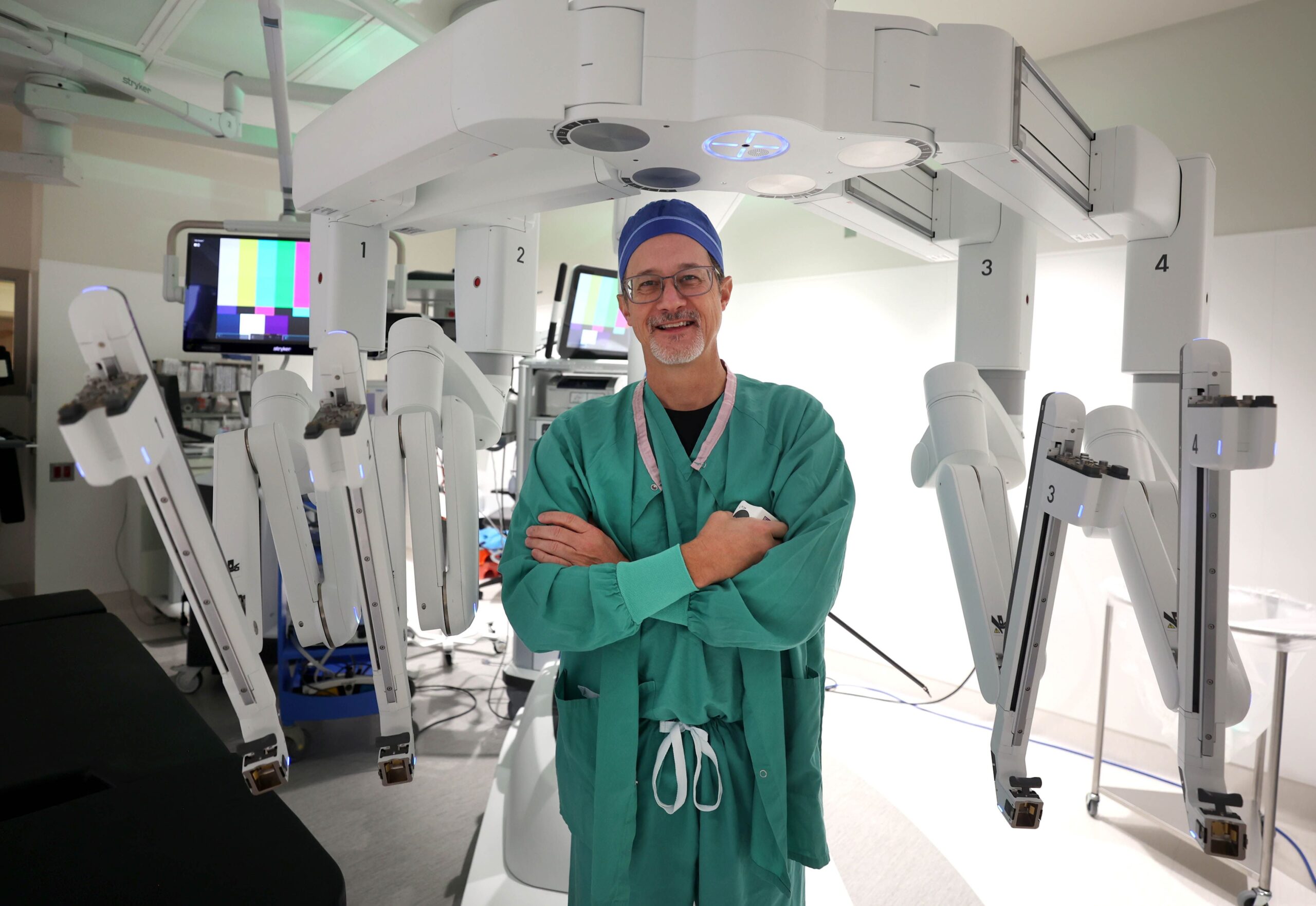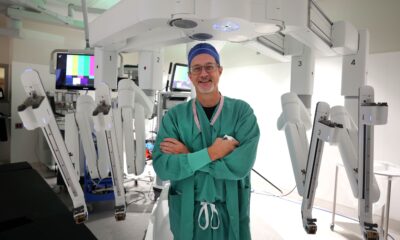Science
DeKalb Hospital Achieves 2,000 Robotic Surgeries Milestone

Northwestern Medicine Kishwaukee Hospital in DeKalb has reached a significant milestone by completing its 2,000th successful robotic-assisted surgery. This achievement follows a substantial investment of $15 million in upgrades to its surgical suite late last year, which included the addition of a second surgical robot. This expansion enhances access to minimally invasive surgical options for patients in the region.
The hospital has utilized the da Vinci Xi Surgical System since 2022, allowing more than half of all surgical procedures to be performed robotically. According to a recent news release, the technology is capable of assisting with various operations, including those related to the prostate, kidney, bladder, and gynecological procedures, as well as general surgeries like hernia repairs and bowel resections.
Dr. Stephen Goldman, a specialist in general surgery at the hospital, highlighted the advantages of robotic-assisted surgery. He explained, “What I would do with my hand, if I [were] doing an open traditional surgery, can now be done using the robot because the robot can match those results.” This method offers the benefits of traditional open surgery but with smaller incisions, leading to quicker recovery times and reduced pain.
Enhancing Surgical Care in DeKalb
The installation of advanced robotic technology marks a pivotal step in the hospital’s commitment to providing top-tier surgical care. Maura O’Toole, president of Northwestern Medicine Kishwaukee Hospital, stated, “The completion of our surgical renovation and the addition of a second robotic surgery platform mark a significant milestone for our hospital.” She emphasized that this investment ensures patients have access to high-quality, minimally invasive procedures without needing to travel far from home.
Dr. Jack Wagoner, another general surgeon at the hospital, noted the prevalence of hernias among patients in the region, particularly due to the physical nature of many local jobs. He stated, “We see incisional hernias, people who have had prior surgeries elsewhere, and they have a hernia from an incision.” The availability of robotic-assisted surgery provides patients with advanced options for treatments such as gallbladder removal, adrenal gland removal, and appendix removal.
Operating the da Vinci system requires surgeons to sit at a console where they can view three-dimensional images of the surgical site. This setup allows for precise control of the robotic arms, enabling intricate maneuvers during procedures.
The Future of Robotic Surgery
Dr. Wagoner, who has been practicing since 1999, remarked that adapting to robotic-assisted surgery was a natural progression for him, having been trained in laparoscopic techniques during medical school. He mentioned, “It really is the next iteration of laparoscopic surgery,” and emphasized that the transition to using robotic technology is far less daunting for new surgeons compared to earlier shifts from open surgery to laparoscopic methods decades ago.
While robotic-assisted surgery may not be suitable for every condition, Dr. Wagoner has observed markedly improved patient outcomes and recovery times. He pointed out, “Especially in this day and age when narcotic use is front and center, the rate of narcotic use with the robotic platform is minimal.” Many of his hernia patients do not even require narcotics for pain management, a significant improvement over traditional open surgery.
Looking ahead, Dr. Goldman expressed optimism about the future of surgical technology, noting the potential impact of artificial intelligence in the field. “I think there’s more to come,” he said, acknowledging the role of new advancements as tools to enhance medical decision-making rather than substitutes for traditional methods.
The da Vinci Xi Surgical System is not exclusive to Northwestern Medicine Kishwaukee Hospital; it is also available at various facilities within the Northwestern Medicine system, including Northwestern Memorial Hospital and others, ensuring that patients across the region can benefit from these advanced surgical options.
-

 World4 months ago
World4 months agoScientists Unearth Ancient Antarctic Ice to Unlock Climate Secrets
-

 Entertainment4 months ago
Entertainment4 months agoTrump and McCormick to Announce $70 Billion Energy Investments
-

 Lifestyle4 months ago
Lifestyle4 months agoTransLink Launches Food Truck Program to Boost Revenue in Vancouver
-

 Science4 months ago
Science4 months agoFour Astronauts Return to Earth After International Space Station Mission
-

 Technology2 months ago
Technology2 months agoApple Notes Enhances Functionality with Markdown Support in macOS 26
-

 Top Stories4 weeks ago
Top Stories4 weeks agoUrgent Update: Fatal Crash on Highway 99 Claims Life of Pitt Meadows Man
-

 Sports4 months ago
Sports4 months agoSearch Underway for Missing Hunter Amid Hokkaido Bear Emergency
-

 Politics3 months ago
Politics3 months agoUkrainian Tennis Star Elina Svitolina Faces Death Threats Online
-

 Politics4 months ago
Politics4 months agoCarney Engages First Nations Leaders at Development Law Summit
-

 Technology4 months ago
Technology4 months agoFrosthaven Launches Early Access on July 31, 2025
-

 Top Stories2 weeks ago
Top Stories2 weeks agoFamily Remembers Beverley Rowbotham 25 Years After Murder
-

 Top Stories6 days ago
Top Stories6 days agoBlake Snell’s Frustration Ignites Toronto Blue Jays Fan Fury












